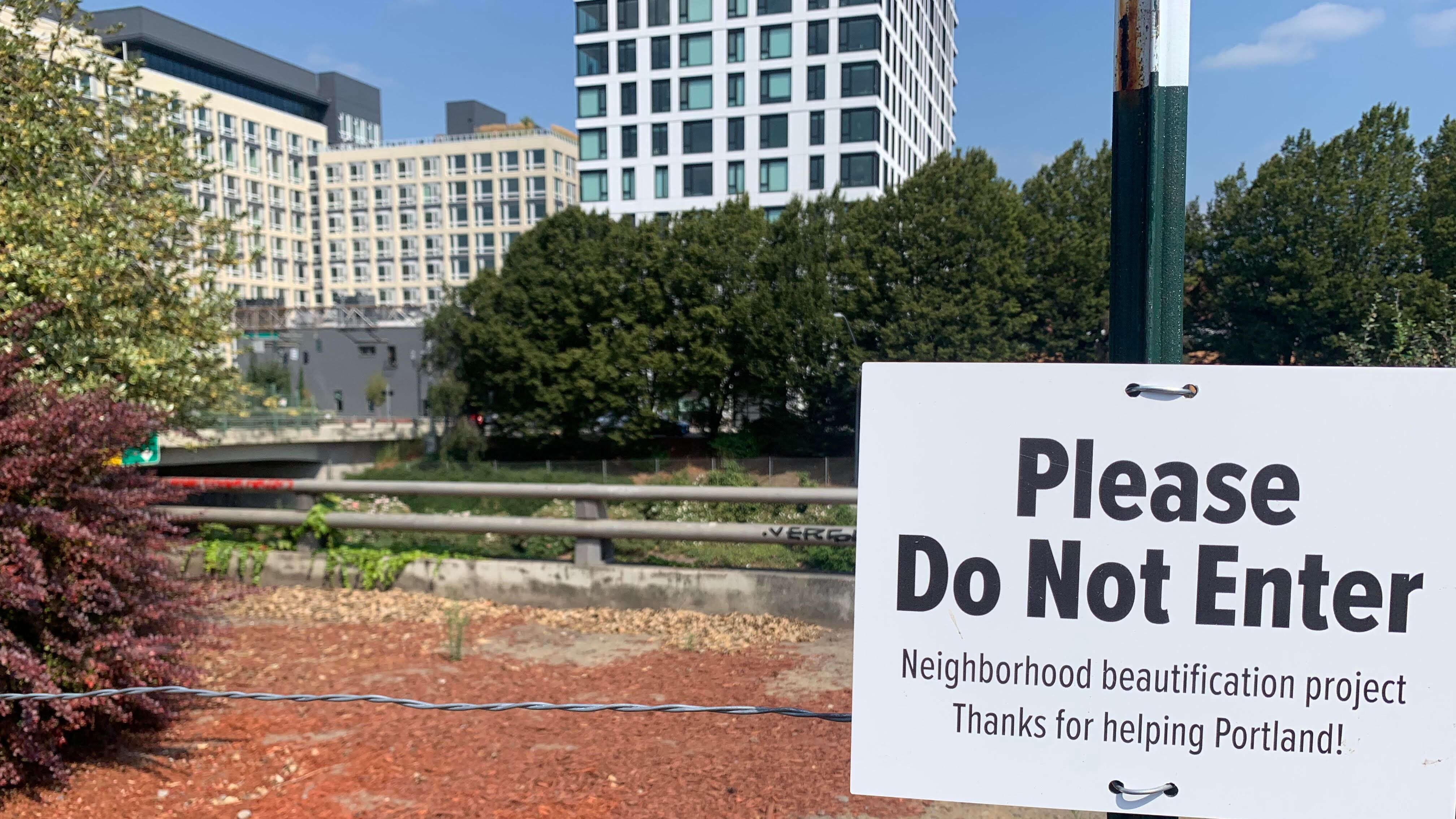The Pearl District Neighborhood Association and a trash-pickup nonprofit have cut an informal deal with the city of Portland to place bark dust, fences and ”Do Not Enter” signs at homeless camps recently swept by the city along Interstate 405.
That nonprofit—We Heart Portland—has partnered with neighborhood volunteers from the Pearl District in the past two months to give six blocks along I-405 in Northwest Portland a face-lift and install other deterrents to tent camping.
As Portlanders debate Mayor Ted Wheeler’s executive order banning tent camping along city streets known as Safe Routes to School, the volunteer effort in the Pearl District shows how the mayor’s previous executive order—banning camping along highways—works in practice.
In some places, people swept from highway shoulders simply return to their previous campsites. In others, a league of volunteers coordinates with the city to ensure that doesn’t happen.
Stan Penkin, president of the neighborhood association, says volunteers flooded the city’s camp complaint portal in an effort to hasten the city’s cleanup of camps along the six-block stretch the groups targeted.
Once the city posted the camp for removal, a city staffer alerted Penkin and We Heart Portland and volunteers urged campers to seek shelter before it was swept and offered to help pick up trash. At the approximately 40 tents swept, Penkin says, he estimates the group referred 20 to 25 people to shelter.
Then, volunteers spread bark dust at the encampment, surrounded it with makeshift twine fencing, and placed signs telling people not to enter, saying it was a neighborhood beautification project.
A staffer in the mayor’s office confirms to WW that the city has been working with the neighborhood association to alert it when the city clears a camp but that no formal agreement has been made in writing.
The unofficial partnership to clear tent camps and take extra steps to ensure they don’t come back comes loaded with controversy.
We Heart Portland is an offshoot of We Heart Seattle, a nonprofit formed in late 2020 by Andrea Suarez. The Seattle City Council rebuffed the organization last year for its tactics, with several city councilors saying its work bordered on harassment of homeless people. One member of the council likened it to burglary.
WW reported on the nonprofit’s arrival in Portland in May.
Suarez is a controversial figure in Seattle. She and the president of the Portland chapter, Kevin Dahlgren, have appeared on conservative podcasts to talk about what they call the “homeless industrial complex” and to argue that mutual aid groups enable homeless people by being too generous with food and tents. That’s drawn the ire of housing advocates in Seattle.
“We’re truth tellers and we question the status quo, and that hasn’t always gone over well.…Work is a virtue,” Suarez told WW in May. “There’s that element of, ‘Someone is cleaning and doing something for me, and I start to feel like that makes more sense than lying over here on garbage and sticking a needle in my arm.’”
The embankments along Interstate 405 are owned by the Oregon Department of Transportation but maintained by the city of Portland, per a 2019 agreement. ODOT spokesman David House says any new infrastructure or installations—such as fencing and signs—would require ODOT’s approval. The agency could not immediately say whether the city or the neighborhood association had sought any permits.
The unofficial handshake deal is one example of City Hall’s eagerness to clear homeless encampments from economic and social hubs of the city—and the groups are offering beautification the city doesn’t have to pay for.
On Friday morning, Mayor Ted Wheeler announced an executive ban on camping along streets deemed safe walking and biking paths to school, an expansive network of roads designated by the Portland Bureau of Transportation.
Wheeler’s decision to exercise his executive powers, which do not require the consent of his fellow commissioners on the Portland City Council, comes as Commissioner Jo Ann Hardesty—the council member most opposed to camp sweeps—is on vacation. (The mayor’s office says the timing of Wheeler’s declaration had nothing to do with Hardesty’s absence.)
Hardesty spokesman Matt McNally says her office wasn’t briefed on the executive order until Wednesday evening: “Our office was not consulted or informed about this declaration otherwise.”
